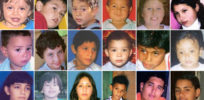Smithsonian

Catch the kids: Argentinian grandmothers use DNA to track down stolen children
The GLP aggregated and excerpted this blog/article to reflect the diversity of news, opinion and analysis. It’s been over 30 ...
Sex chromosomes get messy when they swap DNA
Variety is the spice of life—especially when it comes to genetics. Our species needs DNA to intermingle to create genetic ...
Wheat genes could help revive American chestnut
Blight has made the American chestnut, once "the dominant tree in the canopy," a rare sight in the forests of the East ...
Litterbugs, beware: DNA tests used to shame public offenders
Toss a soda can on the street in Hong Kong, and you could find a DNA-generated picture of your face ...
Can color-changing flowers help change minds of GMO skeptics?
Nikolai Braun and Keira Havens, the two entrepreneurial scientists behind the Fort Collins, Colorado-based company Revolution Bioengineering, are in pursuit of ...
Modern foods genetically modified for centuries
For the health-conscious, the prevailing wisdom is that natural food is the best food. But no matter what studies of ...
Speciation may be possible without geographic division
German researcher Christian Rabeling was digging up ant colonies on a college campus in Brazil when he found something unexpected—certain ...

Tallying the supercentenarians
The recent death of 111 year old Alexander Imich highlighted the difficulties in keeping track of the world's oldest people, ...
Why do mosquitoes always seem to bite you and not your friends? Could it be your genes?
You come in from a summer hike covered with itchy red mosquito bites, only to have your friends innocently proclaim ...
Fetal genome sequencing must strike balance of too much information
Once you go beyond looking for specific genetic mutations—such as those that cause Down syndrome or cystic fibrosis—and begin exploring ...
Genetics and beer consumption raise risk of mosquito bites
Blood type, metabolism, exercise, shirt color and even drinking beer can make individuals especially delicious to mosquitoes. You come in ...
Artist brings our paleolithic ancestors to life
A smiling 3.2-million-year-old face greets visitors to the anthropology hall of the National Museum of Anthropology and History in Mexico ...
Sperm from skin cells have potential for male infertility treatment
Around 7.5 percent of men in the U.S. visit a fertility doctor at some point in their life, according to ...
New job for IBM’s Watson: analyze cancer genetics to match patients with best available drugs
For years, the war on cancer has been about attacking specific body parts—developing treatment and funding research around lung cancer, ...
Scientists build designer yeast from scratch
Humans have been using what they know about the biological world to make stuff for centuries—from beer to antibiotics. But, ...
DNA shows early humans killed off giant ostrich
The moa, a giant, ostrich-like bird, lived on New Zealand until the late 13th century, when it went extinct. But ...
Genetic disorder causes people to be born without fingerprints
In 2007, dermatologist Peter Itin was contacted by a Swiss woman with an unusual quandry: She was having trouble entering ...
Neuroscientist has the genes of a psychopath but an otherwise normal life
One afternoon in October 2005, neuroscientist James Fallon was looking at brain scans of serial killers. “I got to the ...
Toxins that affected your great-grandparents could be in your genes
Michael Skinner’s biggest discovery began, as often happens in science stories like this one, with a brilliant failure. In his ...
Rain keeps giraffe species from interbreeding in Kenya
We tend to think of giraffes as a single species, but in Kenya not one but three types of giraffe ...
Do your genes influence who you love?
Imagine a dating site where, in addition to a completed survey, you have to submit a genetic profile. This could ...
Did early Earth RNA really form on Mars?
At this year’s Goldschmidt conference in Florence, Steve Benner, a molecular biophysicist and biochemist at the Foundation for Applied Molecular Evolution will present the ...
Studying the human genome, ten and counting
The following is an editorial summary. In this interview, Eric D. Green, director of the National Human Genome Research Institute, ...
Creepy or cool? Portraits derived from DNA in hair and gum found in public places
The following is an excerpt of a longer story. It started with hair. Donning a pair of rubber gloves, Heather Dewey-Hagborg collected ...
Scientists published Henrietta Lacks’ genome without the consent of her family
The following is an excerpt. In 1951, Henrietta Lacks, a poor black mother of five living near Baltimore, died from ...
Geneticists try to date the publication of the Illiad
The following is an excerpt. The Iliad—Homer’s story of the Trojan War, and the battle between Agamemon and Achilles—is one of ...
Can your genes predict when you’ll die?
In Greek myth, the amount of time a person spent on earth was determined at birth by the length of ...
The genetics behind Venus, the mysterious two-faced cat
A cat named Venus is one of the most famous felines on the planet. The three-year-old torty has her own ...

